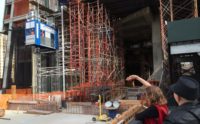Public Works
How New York City's New Debarment Rules Played Out On a Subway Contract

New York City has embarked on a multi-billion-dollar program to add elevators to subway stations. The Metropolitan Transportation Authority had contractors install four new elevators at a Brooklyn station complex earlier this year. Photo: Marc A. Hermann / MTA New York City Transit via Wikimedia Commons
The New York City area's main transit agency, the Metropolitan Transportation Authority, has operated during most of 2019 under strict new emergency debarment rules for contractors. They were put in place quietly earlier in the year and allow MTA to debar a firm if a construction project runs more than 10% late or 10% over budget—no matter what the cause.
In other words, the MTA, which is controlled by Gov. Andrew Cuomo (D), is effectively giving itself the option of eliminating change orders as part of a program to get tough with its engineers, contractors and vendors.
Engineers and contractors last month filed a lawsuit in federal court in New York City to block the new rules as unconstitutional and as violations of regulations for federally funded projects.
Engineers and contractors last month filed a lawsuit in federal court in New York City to block the rules as unconstitutional and as violations of rules for federally funded projects. The MTA has not yet filed a reply.
A Cuomo spokeswoman told the Associated Press that the rules are to prevent taxpayers from “getting ripped off.”
Government watchdogs have complained about the nonpublic way in which the rules were adopted.
A few commuter advocates, too, had worried that the new debarment rules could backfire by producing higher prices at a time the MTA is stretching its financial resources. That's what engineers and contractor groups predicted. As new contracts come up for award under the tough new debarment rule, companies either would refrain from bidding or price the added risk into their numbers.
According to the subway and MTA website Second Avenue Sagas, “Watching contractors drop out of the bidding process like flies, following the implementation of the debarment rule, was anticipated and feared by MTA executives and external watchdog organizations alike. Many have accused Gov. Cuomo of once again taking a wrecking ball to a problem that required a more delicate solution.”
On one recent subway system project, potential competitors did drop out—but the MTA still got its price.
The information emerged at an MTA board subcommittee hearing held Nov. 12.
Test Case
As part of a multi-billion-dollar plan to install elevators at more subway system stations, the MTA sought proposals from a prequalified list of six contractors earlier in the year for design and construction of accessibility upgrades, including new elevators, at a station in the Bronx.
The selection committee for the project invited a joint venture of Citnalta Construction and TAP Elecric Contracting Services, and another competitor, Echo III Enterprises, to negotiate cost and schedule, and eventually picked Citnalta-TAP on the basis of best value and its significant experience on prior subway station elevator projects.
Prequalified contractors also included Halmar International LLC, John P. Picone Inc., Skanska USA Civil Northeast Inc. and Tully Construction Co. Inc.
MTA and Citnalta-TAP agreed to a contract value of $38.8 million, which also covers various architectural and mechanical improvements, an MTA procurement official told the committee. Early completion incentives and liquidated delay damages are included. The station will stay open during the work, another MTA official told the committee.
According to MTA’s procurement staff presentation at the meeting, the $38.8-million Citnalta-TAP contract is 2.8% below the MTA estimate for the project.
But the second-lowest competitor, Echo III Enterprises, had proposed to do the same or similar package of work for $52 million, about 25% more than Citnalta-TAP’s final price. So the winning firm appears to have left a lot on the table, unless the final scope was dramatically different.
One of the bidding firms admitted it did not have the capacity to perform the work.
But according to the MTA staff presentation, three of the four remaining competitors made a point of indicating “they were concerned about the recent legislation and terms and conditions included in the solicitation involving debarment.”
Not Confident Of Staying Within 10%
Sarah Feinberg, chair of MTA's bus and transit committee, sought a clarification from agency staff. “If they were citing risk with debarment, they were not confident in their ability to be within 10 percent?” she asked.
Feinberg, now a consultant, had been Federal Railroad Administration chief from 2015 to 2017.
An MTA staff member said that seemed to be the case.
Board member Veronica Vanterpool mentioned at the subcommittee meeting that MTA had received many comments about the debarment rules during the summer. She is a consultant with a background in environmental planning who previously directed the Tri-State Transportation Campaign.
The three contractors that had declined to bid were “big firms,” she said. Concerns about the debarment rules weakening competition for contracts is something MTA now is seeing “play out in real time,” Vanterpool added.
Vanterpool asked if there were any possible pending update to the rules.
MTA’s acting general counsel, David Farber, said that the emergency debarment rules had been extended until Dec. 16, that the comments are “still being evaluated” and that MTA had not published whether there would be “any changes to a final rule.”




